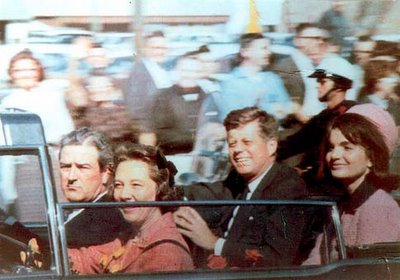An
informative (and long) post over at The Mudville Gazette on the history of the Iraq War from 1990-2003 got me thinking about why we find ourselves occupying Iraq. The Mudville Gazette post has most of the source documents, so I'll just write my thoughts without the usual number of links.
When we stopped the "Gulf War" ground offensive after 100 hours, it's clear that the first Bush administration assumed that Saddam would be overthrown from within; after all, he had basically said that God would decide who would win the war, and then he lost... in the Western experience, such a leader would be replaced. Not for the first time, we didn't understand the Arab mindset. They don't really believe all the slogans they shout. (Actually, some of them do, but they remove themselves from the political discussion by becoming suicide bombers in a kind of Darwinian self-unselection.) Arab governments rule by fear and ruthlessness; the political opposition in Arab countries expects to be tortured -- it's just their way of doing things.
We ended up with a situation where Saddam wasn't replaced after having initiated, and lost, a war of aggression. (I can't think of a non-Arab example of this happening in the last 150 years.) Clearly, he deserved to be removed for his crimes, but we didn't do it when we had the chance. There followed a decade of petty brinksmanship from Saddam, with frequent spankings by the U.S. and Brits that would make him settle down for a while.
After 9/11, it seems like the new Administration decided that they had the political backing to finally give Saddam his just desserts. Not from a "finish Daddy's job" or "grab their oil" point of view, but from a "this guy is going to realize he's going to die before becoming the next Nebuchadnezzar; who knows what he'll do when he starts to feel his own mortality". I think they realized that there was a good chance that he'd do something unbelievably stupid in order to ensure his "place in history", especially if he wasn't sure his sons would inherit his office. As a result, they decided to take him out while they could.
How to convince the American public, and the rest of the world, to go along with it? Well, WMDs seemed to offer the easiest road... everyone "knew" that he had them, and it'd provide convenient cover to the more progressive element who knew, deep down, that it was the right thing to do, but couldn't justify a pre-emptive attack to their more liberal constituencies. (Most of the politicians who voted for the war, but are now complaining about it, knew that the war wasn't about WMDs, and anyone who thinks they did should consider if they want someone so naïve representing them.)
A
current complaint is that the Administration "cherry-picked" intelligence to bolster their claims of an active Iraqi WMD program. I guess I'm not sure that a group attempting to gain support for their position is required to present both sides of the argument. [As far as why we were so sure the Iraqi's still had more than the small amounts of chemical weapons we found, I pretty sure it was because: 1) They
admitted they had them in the mid-90s, 2) We made the assumption they were telling the truth, 3) We saw no evidence that they destroyed them after this time, and 4) They sure acted like they had something to hide. It looks like the assumption we made in step 2) was incorrect -- another example of us not understanding the Arab mindset that to show weakness (admitting destroying the weapons) was more dangerous than the hardships caused by continued UN sanctions.]
Back to the "cherry-picking" argument. Full and complete disclosure of both sides of the argument by the Administration hasn't really been required before -- it seems like presenting the "con" side is the job of the political opponents of a given action.
I can imagine how they would have liked to see the
Declaration of Independence:
"The history of the present King of Great Britain is a history of repeated injuries and usurpations, all having in direct object the establishment of an absolute Tyranny over these States... For imposing Taxes on us without our Consent... but, to be honest, he was just trying to recoup the costs of defending us during the French and Indian War, so he's kind of got a point there."Or FDR's request for a
declaration of war against Germany:
"The forces endeavoring to enslave the entire world now are moving toward this hemisphere. Never before has there been a greater challenge to life, liberty and civilization. Delay invites great danger. Rapid and united effort by all of the peoples of the world who are determined to remain free will insure a world victory of the forces of justice and of righteousness over the forces of savagery and of barbarism... Now, I admit that Germany hasn't actually attacked us, and I have been in secret talks with the British Prime Minister on how to run this war against Germany many months before I requested this, and I plan on fighting Germany first even though they didn't attack us at Pearl Harbor..."In summary: The administration, for right or wrong, decided that we should remove Saddam Hussein and his Baathist thugs from power in Iraq. (I
agree with this decision.) As I've
mentioned before, essentially all the political decision-makers knew why we were doing it, and decided, either because of political calculation or because they really thought it was the right thing to do, to go along with it. Now that we've let it get a little bit out of control they are looking for a politically-expedient way out. I was hoping that, so soon after 9/11, it wouldn't have returned to "politics as usual" in D.C... but it appears that it has.
Disclaimer: None of the ideas I mention above came from any classified material I read... it's just what I think.
Bell-ringer 2016 19 Nov: Rob
blogs on-line journals about this topic twice in a row:
here and
here. For the record, I've never denied that we sold Iraq dual-use techology, including chemical weapons precursors, when they were fighting Iran in the 80s, and I know we didn't protest too much about their use of chemical weapons against our Iranian adversaries then. Still, the fact that we "aided" them 20 years ago shouldn't preclude us from fighting them later (a couple of commenters at
the Mudville Gazette post brought that argument up as well, so Rob isn't alone). Historically, of course, there's no precedent for this; otherwise, in a recent example, we couldn't have fought our WWI allies Japan and Italy in WWII.





















